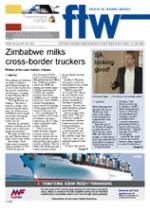While the air cargo terminal
at the recently opened
King Shaka International
Airport (KSIA) in KwaZulu
Natal is furnished with all
the latest and greatest in
equipment and systems, the
cargo handling procedures
are still being bedded in by
the new operations team,
according to Mike Stewart,
chief operating officer of
Worldwide Flight Services
South Africa (WFS SA).
Trading under the banner
of Dube TradePort (DTP),
the cargo terminal’s access
controls, scanning systems
and physical layout are
designed with high security
in mind.
So good, Stewart added,
that even Heathrow
(London’s main air cargo
hub) would be jealous.
Indeed, for the operation
at KSIA, he told FTW, WFS
SA has installed many new
security processes, preempting
similar security
systems being rolled out in
other key airports around
the world.
This includes a newly
designed IT system that
identifies all of the drivers
and vehicles delivering/
collecting cargoes at the
terminal.
“As part of the new ‘air cargo driver identification
system’, we needed to scan
pictures, ID details, and
proof of which companies
employed these drivers, into
our software,” said Stewart
WFS, which handles all
of the international cargo
passing through the DTP
terminal, utilises new
processes and systems like
this to ensure full conformity
with the new Part 108 air
cargo security legislation.
“Under part 108, if the
cargo is deemed to be
‘known’ then the customer
driver delivering the freight
has to be security trained,”
said Stewart. “But, when
we officially opened in
May, through the use of
our system we found that
the vast majority of them
were not trained. In fact,
approximately 25% of the
total export cargo arriving
at our doors is deemed to
be ‘known’. However at the
start of operations in May
we identified that over 95%
of this cargo was found to
be non-compliant under Part
108 and therefore unknown.
So almost all of the cargo we
handled had to be classified
as ‘unknown’, and WFS SA
therefore had to screen it.
But WFS SA played its
own part in this learning
curve.
“We understood that this could be difficult initially
for our freight forwarder
customers so we made
a commitment to all of
the agents that we would
screen all of this cargo
‘free-of-charge’ for the first
three-months until all their
drivers were appropriately
trained,” Stewart added.
“Here we are just into July,
and many of the drivers
now comply with the Part
108 training standards and
the situation is improving.”
Stewart also
acknowledged criticism of
the DTP terminal expressed
to FTW by commentators in
the SA airfreight industry.
He noted the complaint
from one reader who said:
“It’s just not as well suited
to our airfreight needs as it
should be.”
Said Stewart: “This cargo
terminal was designed and
built very much for the
future with 21st century
equipment and processes
in mind, enabling South
Africa to raise its standards
and compete with the best
cargo terminals in the
world.
“The portion of the cargo
terminal now occupied
by SAA and Express
Air Services (EAS) was
originally designed and
fitted out as an express
terminal.
“This made it difficult
once the agreement was
reached to lease this area to
our tenants SAA and EAS
who do also handle larger
items of general cargo as
part of their day to day
business. A number of
modifications to the cargo
terminal had to be made
to facilitate the successful
relocation of both SAA
and EAS into the terminal
and of course, some
compromises had to be
reached
“But I’d disagree with
the statement that it doesn’t
work. We’re making it
work. There has been and
continues to be a huge
amount of co-operation
between DTP, WFS SA and
all of the tenants within the
cargo terminal.”
What had been
described as “another
potential disaster point,”
was answered by Ahmed
Bassa, project executive
(aeronautical) at Dube
TradePort.
This was that the 16 cargo
doors had been equipped
with dock levellers that
were just too high for the
type of trucks used in
Durban – mostly bakkies
and other small pick-ups.
But Dube TradePort
and WFS SA reacted as
soon as this problem was
highlighted, according to
Bassa.
“We have now bought
and installed some mobile
dock levellers which will
lift cargo consignments
from the height of bakkies
and small trucks to the level
of the cargo docks,” he told
FTW.
The final comment came
from the newly appointed
general manager WFS SA
for the KSIA operations,
Darren Coleman.
“We came here both to
teach and learn,” he said.
“But I’d say we have pretty
quickly learned just what
we need to do to make this
terminal work as it should.
“And we do, and will
listen to what we are told by
all of our customers.”
King Shaka Airport answers its critics
30 Jul 2010 - by Alan Peat
0 Comments
FTW - 30 Jul 10

30 Jul 2010
30 Jul 2010
30 Jul 2010
30 Jul 2010
30 Jul 2010
